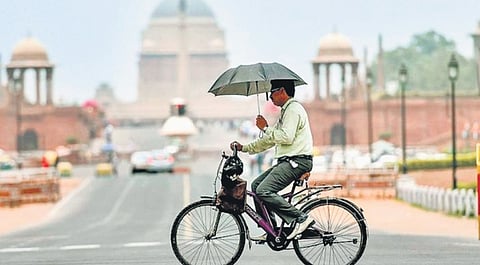Heat, health and economic toll escalate
CHENNAI: India is grappling with the harsh realities of climate change, which have placed intense pressures on health and economic stability. Recent findings from the Lancet Countdown on Health and Climate Change 2024 report reveal the extent of this crisis, with a 50% increase in potential labour hours lost to extreme heat since the 1990s. This has led to economic losses valued at $141 billion in 2023, with the agricultural sector alone accounting for $71.9 billion in income lost due to diminished labour capacity under intense heat conditions.
From 2014 to 2023, nearly 42.7% of India’s land area experienced extreme drought conditions for at least a month each year—double the frequency seen in the 1950s. This recurring drought has led to serious threats to food and water security, a crisis that no longer can be ignored.
The health impacts of heat exposure are particularly severe for vulnerable groups like infants, the elderly, and those with pre-existing health conditions. People in India faced an average of 2,400 hours, or about 100 days, of high heat risk for outdoor activities like walking in 2023 alone. Between 2014 and 2023, heatwave exposure increased significantly, with infants and adults over 65 experiencing an average of 7.7 and 8.4 days of annual exposure, representing a 47% and 58% increase respectively compared to the 1990s.
This trend aligns with observations from Dr Marina Romanello, Executive Director of the Lancet Countdown, who stated, “This year’s stocktake of the imminent health threats of climate inaction reveals the most concerning findings yet in our eight years of monitoring. Once again, last year broke climate change records—with extreme heat waves, deadly weather events, and devastating wildfires affecting people around the world. No individual or economy on the planet is immune from the health threats of climate change.”
Sleep loss has emerged as another serious health issue, as warmer night temperatures prevent restful sleep, affecting millions. According to the Lancet Countdown report, sleep hours lost due to high temperatures rose by 6% between 1990-2023. Elevated nighttime temperatures disrupt the body’s ability to cool down, leading to lighter and shorter sleep durations. Chronic sleep deprivation has been linked to cardiovascular problems, weakened immune function, and even psychological disorders, further straining public health. For millions of Indians without access to cooling devices, especially in low-income communities, sleep loss exacerbates other health vulnerabilities, diminishing physical and mental resilience against heat-related illnesses.
Adding to the economic impact, extreme heat compounds air pollution, another significant health issue. In 2021, air pollution in India led to 1.6 million deaths, primarily from exposure to PM2.5—fine particulate matter linked to fossil fuel combustion, especially coal and liquid gas. These pollutants contribute significantly to respiratory and cardiovascular diseases, cancer, and adverse pregnancy outcomes, costing the economy an estimated $320 billion due to premature deaths.
Despite growing its renewable energy generation to 11% of its electricity in 2022, coal still dominates at 71%, exacerbating these health risks. “Despite this threat, we see financial resources continue to be invested in the very things that undermine our health,” noted Dr Romanello. “Repurposing the trillions of dollars being invested in, or subsidising, the fossil fuel industry every year would provide the opportunity to deliver a fair, equitable transition to clean energy and energy efficiency, and a healthier future, ultimately benefiting the global economy.”
Climate change impacts in India extend beyond heat and air pollution. Rising sea levels threaten around 18.1 million Indians living less than a metre above sea level, putting them at risk for flooding, drinking water contamination, and potential displacement. Meanwhile, warming conditions have intensified the transmission potential for infectious diseases, such as dengue, with an 85% rise in the transmission potential of dengue-carrying Aedes albopictus mosquitoes since the 1950s. Similarly, climate conditions now favour the spread of Vibrio bacteria along India’s coastline, exposing 210 million people living within 100 km of conducive coastal waters.
The Lancet Countdown report stresses that redirecting funds from fossil fuel subsidies to climate adaptation and clean energy initiatives could yield transformative health and economic benefits for India and the world. Fossil fuel subsidies in India reached a record net-negative carbon revenue of $58 billion in 2022, where subsidies far exceeded carbon pricing revenue. This misalignment fuels ongoing emissions and heightens health risks, especially for lower-income populations who bear the disproportionate burden of climate induced health issues.

